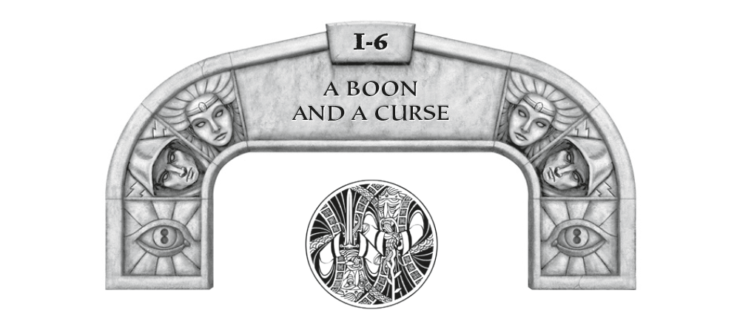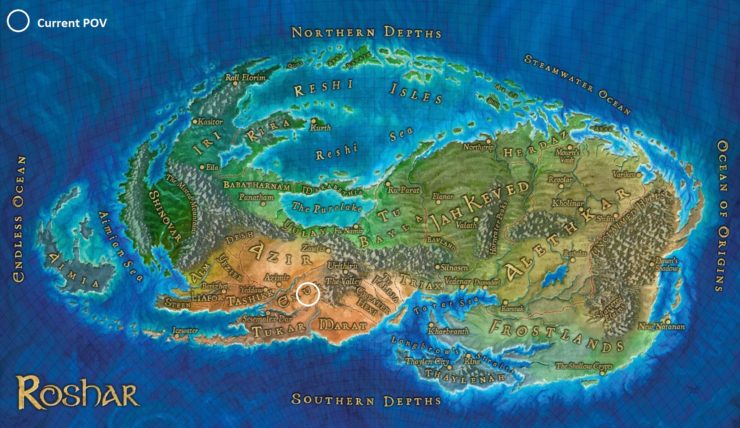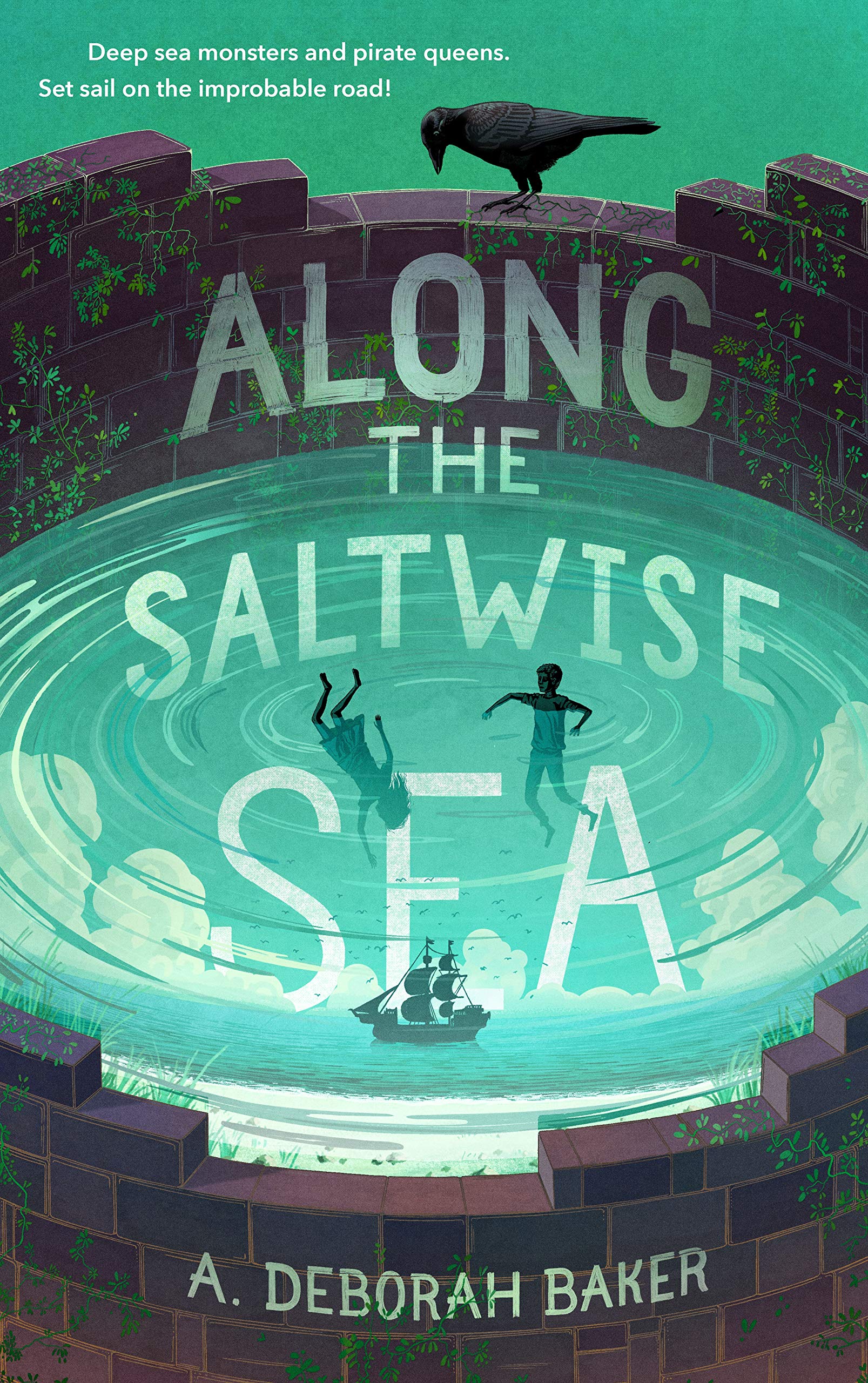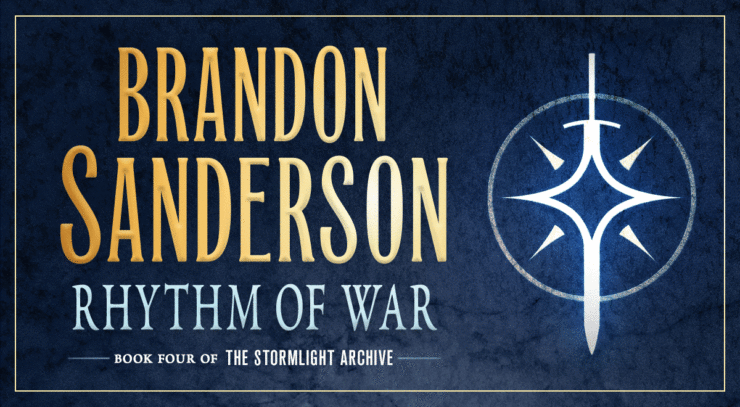Welcome back to the Rhythm of War Reread, O My Chickens and Peeps! As we wrap up the second set of Interludes this week, we’re back in the head of good old King T—and it’s a weird place these days. It’s an odd blend of promising insight and frightening foreshadowing, and we have mixed feelings about it.
Reminder: We’ll be discussing spoilers for the entirety of the series up until now. If you haven’t read ALL of the published entries of The Stormlight Archive (this includes Edgedancer and Dawnshard as well as the entirety of Rhythm of War), best to wait to join us until you’re done.
In this week’s discussion there are spoilers from Mistborn (both Eras) in both Overall Reactions and Oaths Spoken, so if you haven’t read it, watch for the “MISTBORN SPOILER” flag and be prepared to look away.

Heralds: Nalan (Nale), Herald of Justice; Skybreakers; Just/Confident; Role: Judge. Palah (Paliah); Truthwatchers; Learned/Giving; Role: Scholar.
A: Nale and Paliah? On a bet, they’re there for the two people most dangerous to Odium—at least as Taravangian evaluates it today. Paliah probably represents her Truthwatcher Renarin, who sees glimpses of the future and is therefore unpredictable for Odium. Nale, then, would represent Szeth, who is doubly dangerous in being hidden by Renarin’s unpredictability and in the sword he bears.
Icon: The Vine King, for an emotional-Taravangian POV.
A: I’m still fascinated by this icon, with its different implications depending on which way it’s flipped. This Interlude, in which Taravangian thinks about how it’s more common these days to be “not particularly smart,” has the Vine face upright, looking very mournful indeed as he leans on his staff. Is this his Cultivation side as opposed to his Honor side? Or as opposed to his Odium side? Or are the Shards not relevant to the two aspects?
Chapter Recap
WHO: Taravangian
WHERE: Emul
WHEN: 1175.4.6.3—The Everstorm day, when the Urithiru invasion began.
(Note: For the “when” notations, we are using this wonderful timeline provided by the folks at The 17th Shard.)

RECAP: Taravangian waits out the Everstorm in his stormwagon, hoping maybe Odium won’t demand that he order his troops to betray the coalition, and reflecting on his curse and boon. Odium comes to him in a vision, and spends a little too much time boasting; Taravangian realizes that he can be manipulated to some extent, and maneuvers him into displaying again his grand plans for Roshar. While Odium seems to be unaware of it, there is a small portion of the display—around the name of Renarin Kholin—where the details are blotted out by some scar, and Taravangian discovers that his own name is being covered by the scar as well. He also observes that Szeth’s name is nearly covered by the scar, and that Odium seems to have some fear of Szeth and the sword he bears. As Odium departs, Taravangian begins to have new hope that Odium can be defeated somehow, because the thing he most fears is also becoming invisible to him.
Overall Reactions
A: Much as I don’t trust Taravangian, and haven’t for years, this was still an exciting chapter. His realization that Odium is not, in fact, omniscient—that he can be manipulated into showing off as if he were an ordinary human—is actually kind of hopeful. (Of course, it’s scary later, but for now, just exciting and hopeful.) Cultivation’s plans and schemes are… deep.
P: I’m definitely not on Team Taravangian; I do not believe that the end justifies the means, though he certainly feels that they do. Still, it was something to see him discern that which Odium wasn’t even aware of. And… I still fear that Cultivation made a mistake with Taravangian.
A: Yeah… I worry about that. It’s possible she’s getting what she wanted, which would be very much contrary to what I expected of her. But it’s my tentative opinion that she made a mistake, and I sure hope she can find a way to recover before Taravangian does too much damage.
Buy the Book


Along the Saltwise Sea
Smart Taravangian had failed. Besides, he hadn’t just been made intelligent. He’d been given a boon and a curse. Intelligence on one side. Compassion on the other. When smart, he assumed the compassion was the curse. But was it really? Or was the curse that he could never have both at once?
A: And… we don’t know. For one thing, we don’t know if Cultivation even bothers with the “boon and curse” balance the way Nightwatcher does; she makes her own rules, and when she intervenes directly, I don’t think it’s wise to assume that we can identify a specific boon and a specific curse. (I mean… look at Lift. She may not appreciate all aspects of her gift, but I can’t yet find a “curse” in what she was given. The closest I can come is that she wasn’t granted her desire to never change, but that’s not a curse, it’s just a wish unfulfilled. Paige, do you have thoughts on that?)
P: Yeah, Cultivation’s motives with Lift are still a point of speculation. We essentially know why she did what she did with Dalinar and Tarvangian, but not with Lift.
A: Exactly. What is she up to?
In any case, I can understand Taravangian’s two ways of seeing the balance, and if either of his guesses are correct, I think it’s the latter. However, the way things turn out later, I think he’s wrong on both counts. I think the separation was deliberately intended by Cultivation for almost exactly what it did: It gave him the “smart days” when he was able to devise incredible plans with sheer logic and insight, and it then gave him “compassionate days” in which to consider the effect of his plans. I say almost because, if I’m right, the point was to use the compassionate days to examine the plan and find mitigations for the worst of the side effects. If that’s true, his boon/curse mentality limited the intended use of his compassionate days, so that instead of examining the Diagram in a more humane light, he simply wasted those days—not to mention the days when he had a more balanced view.
P: I like the thought of his compassionate days being intended to consider the effects of the plans and actions made on his smart days. But he assumes that his “dumb” days are the expected curse when they very well could have been intended to temper who he was on his smart days.
On that day [when he’d created the Diagram], he’d been a god. On the day when he’d created this fragment a year ago, he’d considered himself a prophet to that god.
A: This is where I think he mistook the proper balance. He considered that the perfect version of himself, and assumed that it was 100% correct—or at least 99.99% corrected, and just needed a little tweaking from the death rattles. If he’d thought of the two sides as complementary, maybe he could have used the super-compassionate days to consider the worst potential side effects, and then used his more balanced days to find ways to correct for the worst of those while still accomplishing the primary goals.
But he didn’t.
P: And this is one reason for my extreme dislike of Taravangian. He venerated that version of himself who created the Diagram and disliked each day that he wasn’t that “brilliant” person again. Nothing was as good as that one day in his mind, and so every other version of himself—especially when he’s compassionate—is inferior. It says a lot when one thinks their emotions are a curse.
A: Doesn’t it, though? He worshipped the Taravangian of that one day, and that’s just gotta be wrong. Which is probably part of why his realizations about Odium are so rich, here. Probably my favorite moment in this chapter, with all its ups and downs, is when Taravangian gets An Idea and actually manipulates Odium:
Hundreds of thousands of panes of writing, hovering as if on invisible glass. This was what Odium had shown him a year ago; it was intended to impress Taravangian with how thorough and extensive Odium’s planning was. And Taravangian had managed to tempt him into showing it off, like a prized stallion.
Storms… Odium could be tricked. By dumb Taravangian.
P: I rather think that Odium is just so arrogant that he underestimates Taravangian, even in his “dumb” state.
A: It’s almost funny, because Odium claims “passion” as his Intent—but he, too, thinks Taravangian is stupid and weak on his compassionate days. I guess we can’t accuse him of being consistent, eh?
If Odium could be lonely, if he could boast, if he could be tricked… he could be afraid. Taravangian might be dumb, but when dumb, he understood emotion.
Odium had incredible power; that was clear. He was a god, in power. But in mind? In mind he was a man. What did Odium fear?
A: This is one of the things I really, really love about what Sanderson did with the Shards. MISTBORN SPOILER!
My initial frustration, after reading Mistborn Era 1, was that IMO, humans are simply not capable of being gods. I was… a bit irritated by a mortal becoming God, so as much as I loved the books, I was not thrilled with the ending. In further books, now, we’re seeing problems with humans holding that kind of power, and… well, I love it. Their powers might be vast, but their human nature is still there, and it still creates the same kinds of weaknesses. Sazed might have the ability to see past and future, the ability to manipulate physics, abilities beyond mortal ken… but he’s still got a human nature, and there are things he can’t entirely figure out. And of course, as I realized with the development of the Cosmere, he’s not God—he’s merely a god.
P: Not only is their human nature still there, their human weaknesses are still there. They may have phenomenal cosmic power but they’re still existing in a relatively itty-bitty living space.
END SPOILER
So here we are with Odium—the powers are nearly infinite, but the mind is still human, and Rayse still fears the possibility of being bested by something. And that something… well, for once I’ll grant that Rayse is smart to be afraid:
Szeth. The Assassin in White. …
Szeth.
The sword.
Odium feared the sword.
…
He seemed… not weak—a being who could spawn storms and destroy entire nations would never be weak. But vulnerable.
A: This made me SO excited!! I had no idea where Sanderson was going with this… Silly me. I should have been terrified.
Still, it was exciting to watch Taravangian figure out Odium’s fear. And then he proceeded with the betrayal, because the end justifies the means. Ugh.
P: Yeah, terrified is what I am now! I’m afraid that T has one up on Dalinar and that he’s going to be blindsided.
He brought out the spanreed board, oriented it, and positioned the pen. When he finally got a response, he wrote out two simple words.
Do it.
P: And thus is his betrayal complete.
Spren and Shadesmar
The golden expanse faded, depositing Taravangian on the floor of his stormwagon. He opened his hand, finding the fragment of the Diagram in it. But… the other pieces were gone. They had vanished when the vision ended. That stunned him, for it implied that he had truly been in another place. That he’d taken the papers there with him, but only this one piece remained when he returned.
A: What do you think? Do the visions happen in Shadesmar? Or in the Spiritual realm? Or can a Shard create another temporary “realm” where they can take a person, either physically or just cognitively as they choose? What does this imply about Dalinar’s Honor visions, or his conversations with Odium?
P: This surprised me because I just assumed the vision took place in their own head, like with Dalinar’s visions in Words of Radiance. He was there in the physical realm, acting out what was happening in his head, but this vision with Taravangian is different. He was physically somewhere else and the destruction of his remaining pages of the Diagram was real. It’s eerie.
Relationships and Romances
He held up the pages and read through them, squinting without his spectacles. The cramped handwriting listed instructions, spliced together with original pieces of the Diagram. Most of it detailed the ploy to unseat Dalinar by the careful reveal of secrets—a plan designed to bring the poor man to his knees, to turn the coalition against him. In the end, that ploy had only galvanized the Blackthorn—and increased his suspicion of Taravangian. Before that day, they had been friends.
P: It boggles me that Taravangian could consider Dalinar to have been a friend even as he was plotting his literal downfall.
A: Right? It’s awful. If you ever thought him a friend, how could you devise and execute this plan?
Bruised and Broken
He so wished he could be smart. When had he last been intelligent? Not brilliant—he’d given up on feeling that way again—but merely smart? The last time had been… storms, over a year ago. When he’d planned how to destroy Dalinar.
A: And… that takes away some of the excitement, when I think about it, because that whole plan was vicious and terrible. It’s nice to see he’s not exactly proud of it, or pleased by the knowledge that he betrayed a friend. He’s actually kind of glad it didn’t work, it seems, so I guess there’s that?
P: I still have no compunction to feel pity toward the man. He really shouldn’t continue to see himself as Dalinar’s friend since he had tried to have him killed – twice! – and was plotting his downfall the entire time.
A being unburdened by empathy, capable of seeing straight to the heart of matters. Yet also a being who couldn’t understand the context of his efforts. … Smart Taravangian knew the how but not the why.
A: This is one of the few times since the end of The Way of Kings that I almost started to like Taravangian again. It’s kind of a theme for us today, I guess, but this belated recognition that maybe Smart Taravangian wasn’t All That is… better than we’ve gotten from him for a long time.
All this, he thought, to save a handful of people? He’d preserved Kharbranth by selling out the rest of humankind. He was certain Odium could not be defeated. And so, saving a remnant was the only logical path. Right now, that seemed pathetic.
Smart Taravangian considered himself so brilliant, so masterful, but this was the best he could do?
A: Exactly!
P: This is the problem with Taravangian: He convinces himself that his end of preserving Karbranth justifies the means by which he accomplished that feat.
A: I think that’s the redeeming aspect of this Interlude—he finally questions that assumption. It may only be temporary, but for once he recognizes the absolute lameness of this approach.
Oaths Spoken, Powers Awakened
Why specifically can’t the Diagram see Renarin Kholin? the notes read. Why is he invisible?
Smart Taravangian had moved on quickly from this question. Why waste time on something minor that you couldn’t solve? Dumb Taravangian lingered on it, remembering a later time when he’d been visited by Odium. Odium had shown Taravangian something, and Renarin … Renarin Kholin had appeared as a chain of blacked-out futures, unseeable.
A: This could be wrong, of course, but it does seem reasonable that since Renarin Truthwatcher can see potential futures, he can choose how to react to the possibilities—and that makes him harder (impossible?) for Odium to anticipate. MISTBORN SPOILER:
It’s a bit like burning atium on Scadrial: One person burning it can see into the future and know what their opponent will do, but if the opponent burns it too, it negates the advantage.
P: Yeah, I’m not sure if it’s just the Truthwatcher thing or if it might also have something to do with his particular spren. Or… both.
END SPOILER
…Taravangian saw something half-consumed in the black scar.
His own name. Why? What did it mean?
I’m close to Renarin, Taravangian realized. Everyone close to the boy has their future clouded. Perhaps that was why Odium was wrong about Dalinar.
Taravangian felt a surge of hope.
Odium couldn’t see Taravangian’s future right now.
A: I think at the first read, I hoped this would mean Taravangian would find a way to rejoin the coalition against Odium. Sigh. It could never be that straightforward, could it?
P: Taravangian wasn’t about to try such a thing and risk his precious Karbranth. Plus, with his attempted murter of Dalinar and then his betrayal naturally lead to a big boss fight with him. Can’t let Dalinar battle tired and sickly Odium, can we?
Geography, History, and Cultures
“Could you not spare them?” Taravangian asked, tears in his eyes. “The people of Jah Keved, the Iriali, those who come to you willingly. Why waste their lives?”
“Oh, I will not waste them, Taravangian,” Odium said. “Their lives will be spent as they expect—in war, in glory, in blood. I will give them exactly what they’ve been asking for. … They will fight in the war they’ve been promised since birth, and though it will consume and destroy them, they will enjoy it. I shall make certain of that fact.”
…
Odium still intended to use all of humankind as his frontline troops, once he won Roshar. He would throw their lives away, turn them into slaves focused on fueling his war for the heavens. He would use their blood to preserve the singers, which Odium saw as more valuable troops.
A: I’m stunned at how Odium’s plan matches the Vorin beliefs in the battle for the Tranquiline Halls and all that. The question is… did Odium have a hand in crafting the whole religion? Or is he just taking advantage of it?
We’ll be leaving further speculation and discussion to you in the comments, so have fun and remember to be respectful of the opinions of others! Next week, we’ll be back to launch into Part Three, as Chapter 44 picks up right where we left off with Kaladin.
Alice is a Sanderson beta reader and administrator of two fandom facebook groups. She lives in the Pacific Northwest with her husband and two kids, with extended family out back. She’s currently writing from smoky Montana, where she’s been visiting her sisters.
Paige resides in New Mexico, of course. She works full-time, goes to school full-time, beta reads part-time, mods or admins 3 Stormlight-themed Facebook groups part-time, and writes part-time. She wishes sleep wasn’t necessary because there’s just too storming much to do! You can find her writing at www.amazon.com/Paige-Vest/e/B0797Z37XV and www.patreon.com/paigevest.










